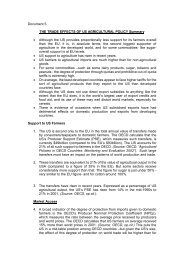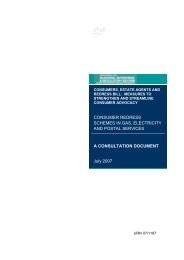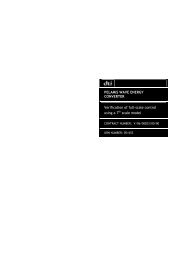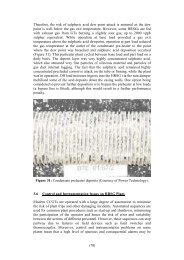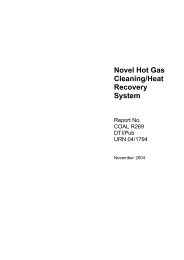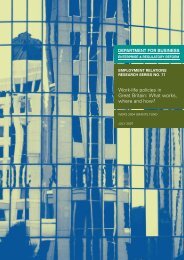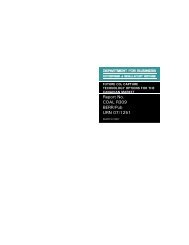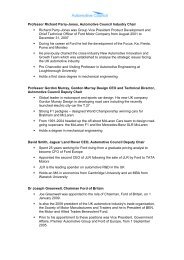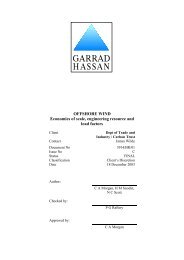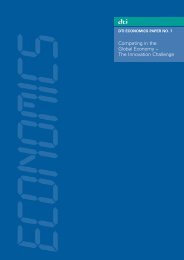Coal Fired Power Plant Operations - DTI Home Page
Coal Fired Power Plant Operations - DTI Home Page
Coal Fired Power Plant Operations - DTI Home Page
You also want an ePaper? Increase the reach of your titles
YUMPU automatically turns print PDFs into web optimized ePapers that Google loves.
22 PT/03/BD1076/R Revision 2<br />
6. The Sentient system provides SCS with many options for the unit optimiser. As yet<br />
there are no details about how different options compare.<br />
11 HANDLING CONFLICT AMONG OPTIMISERS<br />
The description of the individual optimisers above has highlighted several possible sources<br />
of conflict. Although these optimisers are similar to UK models there are significant<br />
differences between the optimisers currently used in the UK and USA. This section thus<br />
focuses on the expected conflicts between typical optimisers that may be used in the UK.<br />
For corner fired boilers with burner tilt, then lowering the tilt may reduce the steam<br />
temperature and thus affect the plant efficiency. Lowering the burner tilt is generally<br />
beneficial for both NOx emissions and reducing carbon-in-ash and thus is something that<br />
GNOCIS may advise. GNOCIS models for these corner fired-units now take in steam<br />
temperature data and if the steam temperatures become too low then they are designed to<br />
raise the tilt until the temperature recovers. If the GNOCIS model did not include a<br />
knowledge of steam temperature behaviour then there would be a clear conflict between<br />
the GNOCIS advice and the recommendation of an efficiency package. The effect upon<br />
steam temperature has thus been built into the GNOCIS model so that the advice from the<br />
individual optimiser is very much closer to the advice that a unit optimiser will provide.<br />
Making the individual optimiser more sophisticated is a good way of reducing the conflict<br />
between different optimisers.<br />
In some cases GNOCIS will increase the excess air in the boiler to achieve better NOx or<br />
carbon-in-ash results. The increase in excess air however may increase the re-entrainment<br />
of dust within the ESP and thus its collection efficiency may be reduced slightly. The<br />
GNOCIS recommendation would clearly conflict with the recommendation of an ESP<br />
optimiser that is designed to reduce emission levels. It is however easy to input the<br />
emission signal into GNOCIS and reduce the excess air to meet the emission levels.<br />
GNOCIS is thus constrained to find an optimum with less excess air. This is another<br />
example where a simple constraint within the individual optimiser can reduce the conflict<br />
between optimisers.<br />
In both the above cases objectives have been prioritised. In the first case it was decided<br />
more important to maintain steam temperatures rather than achieve the optimum GNOCIS<br />
recommendations. In the second case it was also decided that the emission limit must be<br />
met ahead of the GNOCIS objectives. Thus recent developments in individual optimisers<br />
have reduced conflicts between optimisers with rules of this type. This reinforces the view<br />
that only a few conflicts will remain to be resolved by the unit optimiser and thus it should<br />
not be the main interface between the DCS and the individual optimisers. The conflicts<br />
identified so far have been resolved by relatively easy addition of constraints to the<br />
individual optimisers. At this stage it is unclear whether all model conflicts will be<br />
resolvable by the addition of simple constraints. It certainly seems quite easy to tidy up<br />
many boundaries of the individual optimisers and reduce possible conflicts.<br />
The Unit Optimisation algorithm was based on a unit cost function involving high-level<br />
plant variables. The task of the unit optimisation software was to minimise this unit cost



